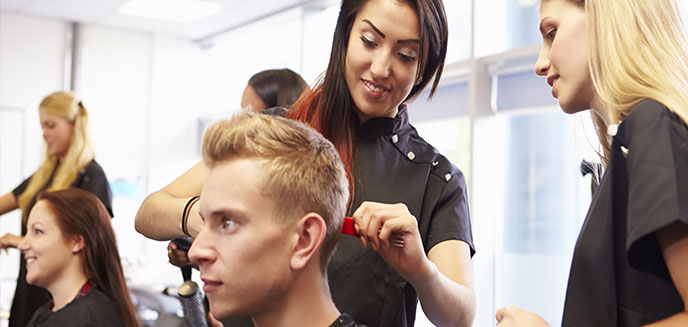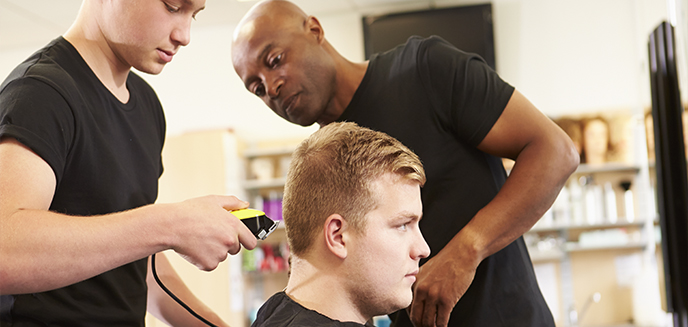Campaigning for you: Apprenticeships
The NHBF does a huge amount of campaigning and lobbying on behalf of its Members. We have raised awareness for important topics that our Members have asked for such as, employment law, improvements to education, fairer tax, mental health, and more.
Our latest Spotlight feature focuses on our campaigning work for apprentices.
Lasting careers
Apprenticeships are vital in providing clear long-term paths to skilled employment. The hair and beauty sector is a significant employer covering every corner of the country, providing jobs and opportunities for lasting careers.
However, there has been a significant decline in young apprentices coming into the hair and beauty sector in recent years. In 2019, in England, 9,932 hair apprentices were starting their careers in the industry. In 2020, the numbers starting up declined to 7,037.

Why the decline?
The decline of apprenticeships in the sector has been attributed partly to schools broadly promoting academic routes and school leavers influenced by a negative perception of apprenticeships. Growth in self-employed practitioners within hair and beauty has also significantly impacted self-employed individuals who rarely employ apprentices. These are, however, deep routed issues that require longer-term solutions. The pandemic has played a part in the decline of people currently in an apprenticeship in our sector. Our recent survey has shown that more than half of businesses have cut apprenticeships during the pandemic (55%).
Feedback from the NHBF industry survey has shown only 11% are likely to take on new apprentices in the next three months as businesses are increasingly unable to afford apprentices.
Cost for an apprentices
Despite recent government incentives, the jump in cost in the second year for older learners greatly influences the apprentices they take on, reducing opportunities for those wishing to reskill. Salons avoid employing older apprentices as apprentices aged 19+ can only be paid at the apprenticeship rate for the first year of their apprenticeship, with the following year wage adjusting to the appropriate national minimum wage band for their age. This jump in wage cost to the employer can be £3,000 to £7,000, depending on the apprentice's age. This is simply unaffordable for many salons when the student cannot generate any income for the salon or barbershop.
The Government has shown a commitment to skilling and training the UK's workforce as we come out of the pandemic. The Government's latest Skill Recovery Package, whilst welcomed, offered £3,000 to employers for each new apprentice they hire. With a typical 16-18yr old apprentice full-time wage for 24 months (the period of the apprenticeship) costing around £14,660 and a typical salary for an apprentice aged 19+ being about £20,800 – the £1,500-£2,000 funding provides no incentive for employers within the sector during this challenging financial period.
The eligibility criteria also fail to recognise how new apprentices generally come into the sector. The £3,000 is only available to employers taking on new apprentices and cannot be paid for existing Saturday staff. Salons typically enrol shampooists / Saturday staff as standard practice in the personal care sector to mutually trial the potential apprentice before committing to a two-year apprenticeship programme.
Despite good intentions, many employers cannot afford to keep on existing apprentices in the current climate, with the growing deficit between reliefs/grants and fixed outgoings during the closure, rising debt and an inability to generate income.

NHBF Campaigning for you
The NHBF will continue to lobby the Government to discuss how we can get the best future apprenticeships. To address these barriers, as a sector, we are calling for:
- More attractive apprenticeship incentives to employers to make it financially viable for them to keep on and recruit future apprentices. This includes more targeted incentives to SMEs, micro-businesses and even the self-employed model as it continues to grow.
- Affordable apprenticeship schemes specifically for small businesses, acknowledging that they account for 99.3% of the total trade (100% of the hair and beauty sector) and three-fifths of UK employment.
- Funding to support the additional £4,000-£7,000 cost per apprentice to cover the extra six months that apprentices must undergo to catch up on their missed learning and complete their End Point Assessment.
- Greater support and initiatives focussed on employing older apprentices who are thinking of retraining to address the looming skills gap in the hair and beauty industry. For older learners' wages rates double in the second year for employers. This is a massive disincentive, especially at such a fragile and challenging time for businesses. Wages make up 50% or more of costs for most people in our sector (three in four), so changes to this significantly impact business costs.
- Restraint on further increases to the apprenticeship rate until the sector can begin its recovery. Only one in five businesses that usually employ apprentices could rule out reducing the number they take on over the next 12 months, with 63% sure they would have to cut back. The increase in the apprenticeship rate was cited as the most common motive behind this, over and above the impact of COVID.
You may also be interested in...
The NHBF campaigns at the highest levels to protect and promote our Members' interests. Find out what we've achieved and which issues we're currently campaigning about, including business rates, self-employment and VAT. Find out more.

